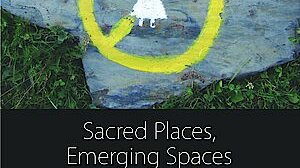Religious Pluralism in the post-Soviet Caucasus
Mohrenstraße 60
10117 Berlin
Book Launch (in German)

Based on fresh ethnographies in Georgia, Armenia, Azerbaijan, and the Russian Federation, the book Sacred Places, Emerging Spaces discusses vanishing and emerging sacred places in the multi-ethnic and multi-religious post-Soviet Caucasus. In exploring the effects of de-secularization, growing institutional control over hybrid sacred sites, and attempts to review social boundaries between the religious and the secular, these essays give way to an emergent Caucasus viewed from the ground up: dynamic, continually remaking itself, within shifting and indefinite frontiers. Two of the authors will present central topics of the book and discuss their findings with expert guests.
“This volume shares in a rich resurgence of writing on religious activity across the former Soviet Union and particularly in areas of the Caucasus, offering sharp insight into arguably one of the most popular religious traditions, shrine pilgrimage, about which we know surprisingly little. The editors have gathered the highly qualified scholars for the task, including a number of specialists from the Caucasus proper.” Bruce Grant, New York University
Participants
- Dr. Tsypylma Darieva studied history and oriental studies in St. Petersburg and social anthropology in Berlin. Her project at ZOiS deals with the transformation of urban spaces and religious pluralisation in Eurasian cities. Darieva is the author of Urban Spaces after Socialism. Ethnographies of Public Places in Eurasian Cities (Campus, 2011), and of the forthcoming volume Sakralität und Mobilität in Südosteuropa und im Kaukasus.
- Dr. Jeanne Féaux de la Croix is a social anthropologist at Eberhard-Karls University Tübingen where she leads a Junior Research Group on the Cultural History of Water in Central Asia. She is currently researching phantom infrastructure projects, the perception of glacier melt and bridge histories in Kyrgyzstan. Féaux de la Croix is the author of Iconic Places in Central Asia: the moral geography of pastures, dams and holy sites. Transcript: Bielefeld.
- Dr. Uwe Halbach, political scientist, is a senior associate at the German Institute for International and Security Affairs in Berlin. His research focuses on Russia/CIS, Central Asia and the Caucasus, religion and society, Islam in the CIS region as well as unresolved conflicts in the Caucasus region.
- PD Dr. Florian Mühlfried is a social anthropologist in the Caucasus Studies Programme at the Friedrich Schiller University of Jena. Previously, he was a research fellow at the Max Planck Institute for Social Anthropology and a visiting professor at UNICAMP, Brazil. He has published the monograph Being a State and States of Being in Highland Georgia (Berghahn, 2014), a book on feasting in Georgia (ibidem, 2006) and edited the volume Mistrust: Ethnographic Approximations (Transcript, 2017).
- Chair: Regina Elsner (ZOiS)